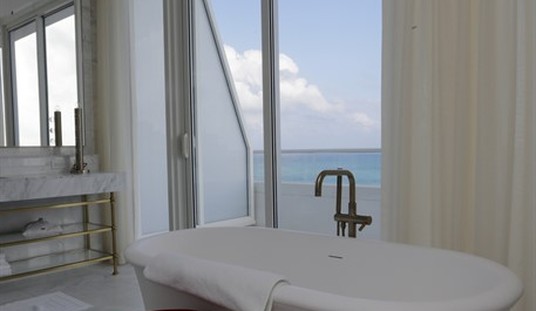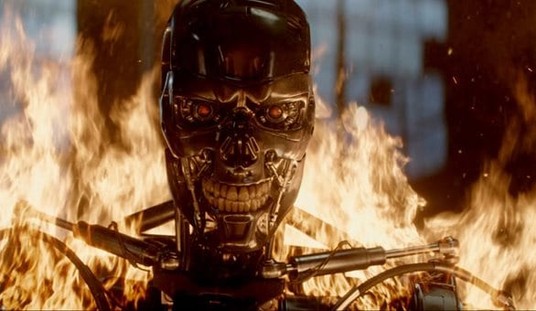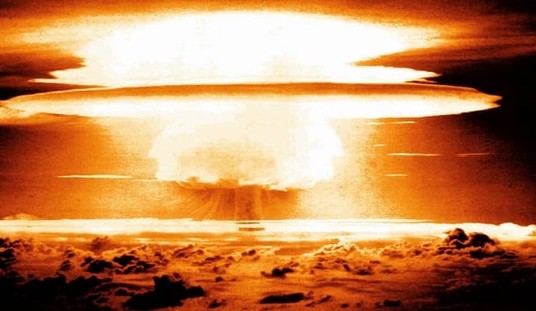Ever since state and local governments started going batsh** crazy in their response to Wuhan virus, Democrat governed cities, and states have made it a practice to try to use “public health” as a way of suppressing attendance at religious services. In states as widely spread California, Kansas, Kentucky, New York, New Jersey and Mississippi (to name just a few) you found various jurisdictions using the smokescreen of limiting public gatherings for the sake of public health to close churches, penalize church members who showed up for services, and sic the police on funerals to break them up.
The effect of these orders has been to allow state and local governments to place an asterisk by the First Amendment. That footnote to the First Amendment states that the right to worship and assemble is contingent upon the government’s approval of the purpose. So you can’t have a funeral, but you can attend a BLM riot.
At the end of May, it looked like the line may have been drawn in a series of Supreme Court orders that seemed to say that religious freedom could be restricted by administrative fiat so long as the restriction placed upon a Constitutional right did not exceed that placed upon your desire to have clean clothes or buy a gallon of soy. These rulings seem to be more or less codified in a 5-4 decision that recognized the Public Health Exemption to the First Amendment but limited it. The case came from California:
The vote was 5 to 4, with Chief Justice John G. Roberts Jr. joining the court’s four-member liberal wing to form a majority.
“Although California’s guidelines place restrictions on places of worship, those restrictions appear consistent with the free exercise clause of the First Amendment,” Chief Justice Roberts wrote in an opinion concurring in the unsigned ruling.
“Similar or more severe restrictions apply to comparable secular gatherings, including lectures, concerts, movie showings, spectator sports and theatrical performances, where large groups of people gather in close proximity for extended periods of time,” the chief justice wrote. “And the order exempts or treats more leniently only dissimilar activities, such as operating grocery stores, banks and laundromats, in which people neither congregate in large groups nor remain in close proximity for extended periods.”
Last night, John Roberts had the chance to hold fast to a horribly misguided though at least defensible (if you turned the lights way down and looked at it long enough from just the right angle) ruling. He didn’t. The Chief Justice we have known to fold like a cheap suit any time he stands the risk of getting bad press over something folded just like a cheap suit.
The case comes from Nevada, where movie theaters and…wait for it…casinos are limited to 50% of their fire code capacity, but churches, no matter how large, are limited to 50 people. This, in light of the California decision, would seem to be a slam dunk. You can’t do the “social distancing” bullsh** at a craps or roulette or blackjack table. And the idea that people aren’t going to “congregate” is just silly. But, caving to the pressure to “do something” about Wuhan virus so that he can seem like a “reasonable conservative” to the media and curry favor with them, Roberts suddenly found that gaming had a higher priority than the Constitution.
The Supreme Court on Friday rejected a request from a church in Nevada to block enforcement of state restrictions on attendance at religious services.
The vote was 5 to 4, with Chief Justice John G. Roberts Jr. joining the court’s four more liberal members to form a majority.
The court’s brief order was unsigned and gave no reasons, which is typical when the justices act on emergency applications. The court’s four more conservative members filed three dissents, totaling 24 pages.
You can tell how shameful this is by the fact that Roberts didn’t even try to rationalize this travesty with his previous decision. He just voted with the anti-American wing of the court and said nothing.
Justice Samuel A. Alito Jr., in a dissent joined by Justices Clarence Thomas and Brett M. Kavanaugh, wrote that the distinction made no sense.
“The Constitution guarantees the free exercise of religion,” he wrote. “It says nothing about the freedom to play craps or blackjack, to feed tokens into a slot machine or to engage in any other game of chance. But the governor of Nevada apparently has different priorities.”
“A public health emergency does not give governors and other public officials carte blanche to disregard the Constitution for as long as the medical problem persists,” Justice Alito wrote…
“That Nevada would discriminate in favor of the powerful gaming industry and its employees may not come as a surprise,” he wrote, “but this court’s willingness to allow such discrimination is disappointing.”
In his own dissent, Justice Brett M. Kavanaugh agreed that the case was straightforward.
“Nevada’s 50-person attendance cap on religious worship services puts praying at churches, synagogues, temples and mosques on worse footing than eating at restaurants, drinking at bars, gambling at casinos or biking at gyms,” he wrote. “In other words, Nevada is discriminating against religion.”
Roberts has moved beyond the point of trying to gaslight us with the nonsense that judges are non-partisan–remember that “there are no Obama judges” goofiness?–to making common cause with the liberal wing of the court on basically any matter that may be viewed as conservative. In one case after another, this term Roberts has joined the left in making America weaker.
While his bizarre reasoning in regards to DACA is easily explained by a weak, insecure man seeking the plaudits of the press rather than attracting their ire by doing the right thing, that error is easily correctable. This, however, is not. This decision locks into place the ability to effectively prohibit religious services if they can come up with even a wildly implausible reason for doing so. This decision was a gut-blow to the very foundations of the Republic, and there was literally no reason for him to do so that can be justified in light of his reasoning just a month-and-a-half ago.













Join the conversation as a VIP Member